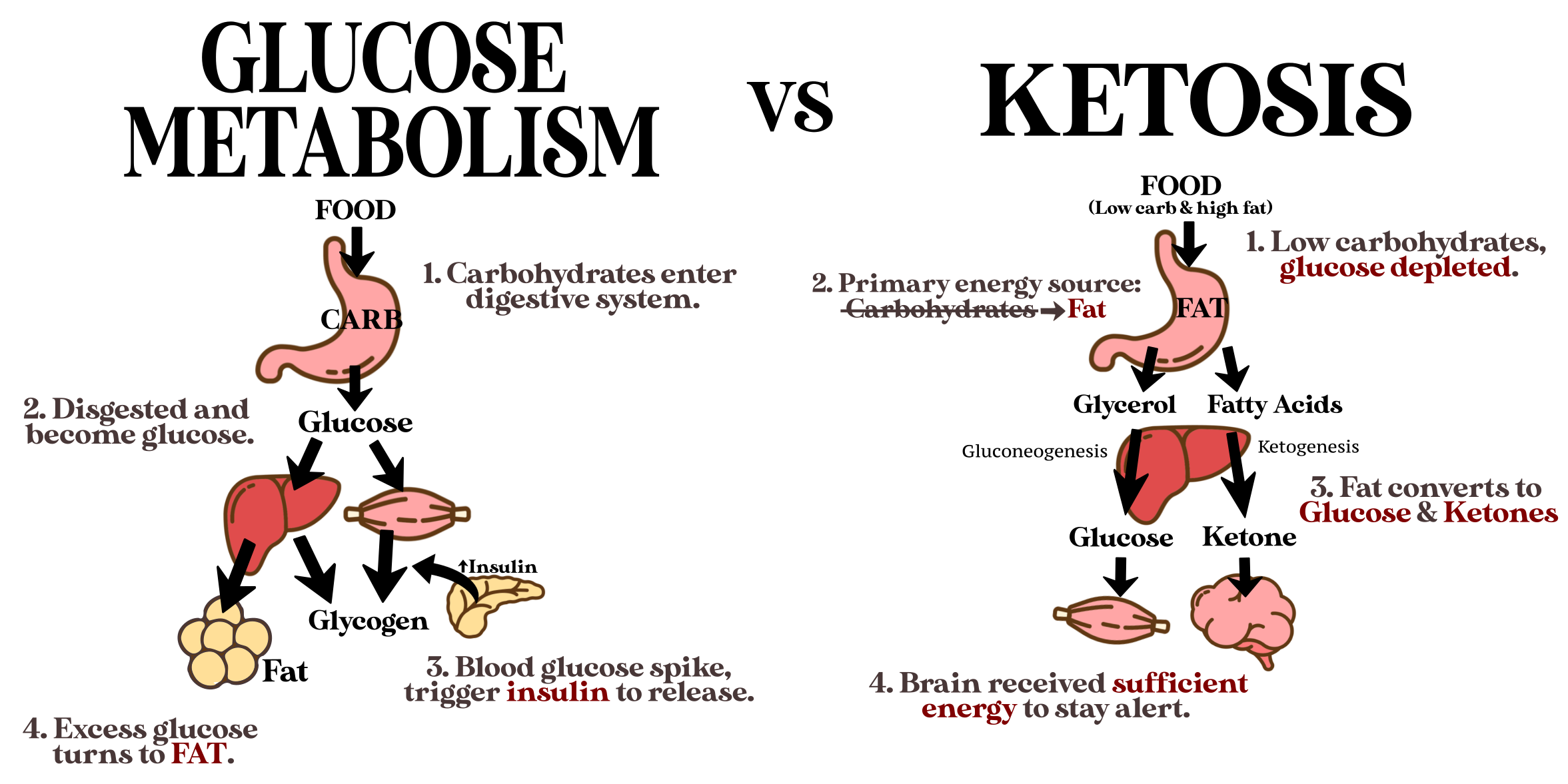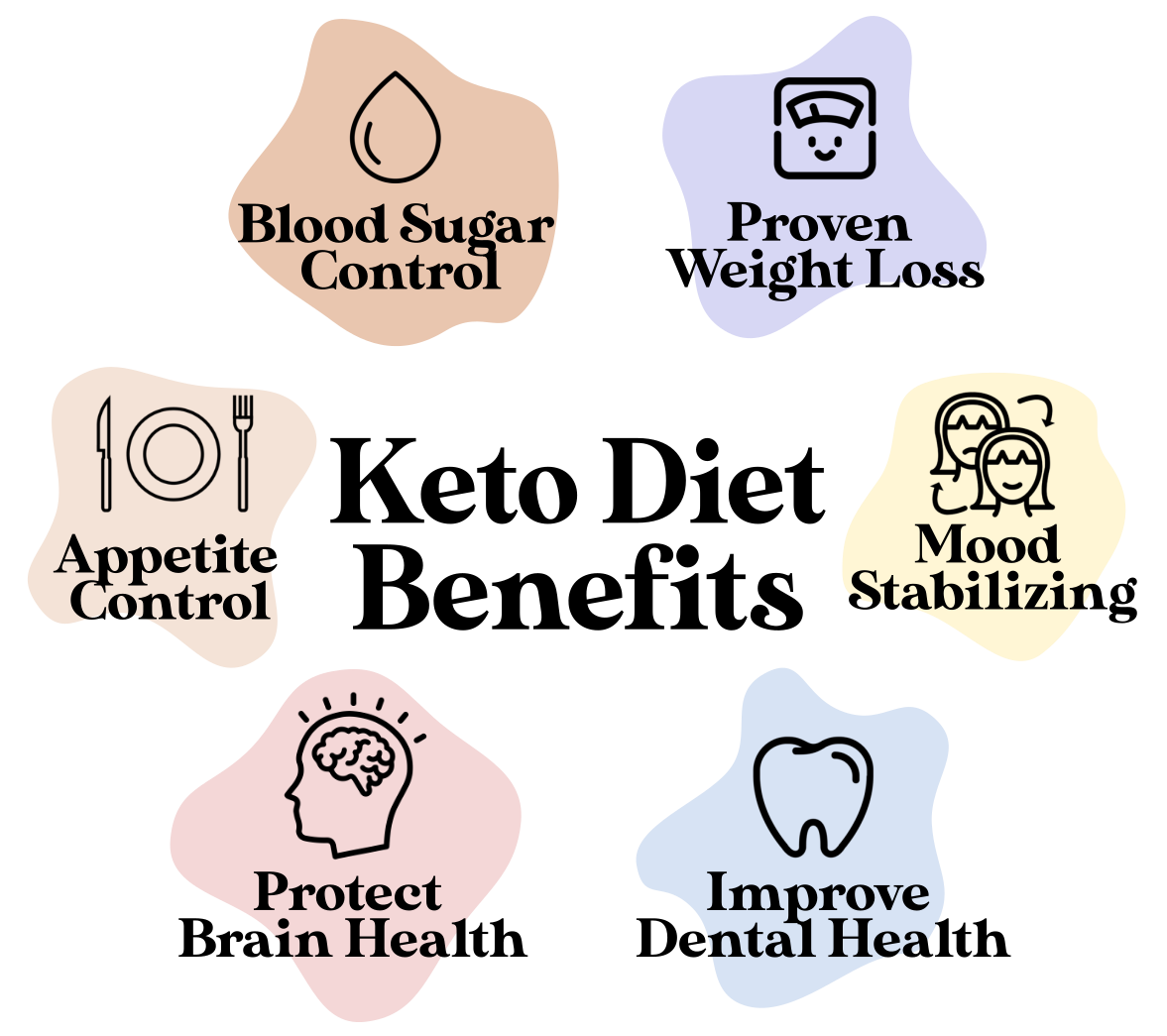
WHAT IS A KETO DIET?🥥
I guess a lot of you who are in process of trying to lose weight would’ve come across this term “KETO DIET” while trying to search for the best diet plan for yourself. 💖.
Keto Diet is a diet that restricts your carbohydrates and glucose intake to mimic starvation so your body will break down and utilize fat as primary energy. It consists high amount of fat, moderate protein and low amount of carbohydrates, which:
- 65-70% calories are from fat;
- 25-30% from protein;
- Around 5% from carbohydrates (ideally, net carbs below 20g/day)
You might be asking, "Do I need to drink liters of oil to enjoy the benefit of keto diet?"
The answer is "NO!"
A gram of fat has about 9 calories, while a gram of protein or fat has 4 calories. Each gram of fat has more than twice as many calories as protein & fat.
For examples, when you eating 100g of salmon that cooked with 1tbsp of oil. you will be gaining 26g of fat & 22g of protein, which are around 234 calories from fat & 88 calories from protein.
Fat is the primary source of energy when you're on keto so make sure you're feeding your body with healthy fats, including avocado, coconut oil, fatty fishes and fat cuts of meat. Here is the food pyramid created by us to illustrate the portion of food you should be feeding your body!

Besides of the high fat consumption, you might also be wondering, what is the "net carbs".
During keto, you will be advised to limit your net carbs to below 20g per day. Net carbs are referring to carbs that can be digested and affect your blood glucose and insulin level. For instance, fiber and sugar alcohols which are largely indigestible will not be counted in net carbs.
Here comes the calculation of net carbs:

THE SCIENCE BEHIND KETO DIET
Do you know it's not fat that makes you fat?
During normal diet, carbohydrates will be digested and convert to 𝗴𝗹𝘂𝗰𝗼𝘀𝗲 as primary energy source for all body function. Excess glucose will trigger pancreas to release insulin, excess glucose will convert and store as 𝗚𝗹𝘆𝗰𝗼𝗴𝗲𝗻. When liver is saturated with glycogen, any 𝗲𝘅𝗰𝗲𝘀𝘀 𝗴𝗹𝘂𝗰𝗼𝘀𝗲 will 𝗰𝗼𝗻𝘃𝗲𝗿𝘁 𝘁𝗼 𝗳𝗮𝘁 and stored in adipose tissue.

Some people call keto diet as bio hacking because keto diet makes your body enters another metabolic state, ketosis. Ketosis mimics starvation and turns 𝗳𝗮𝘁 to primary energy sources instead of glucose. Carbohydrate restriction and abundance of fats initiates 𝗞𝗲𝘁𝗼𝗴𝗲𝗻𝗲𝘀𝗶𝘀 and 𝗚𝗹𝘂𝗰𝗼𝗻𝗲𝗼𝗴𝗲𝗻𝗲𝘀𝗶𝘀 to provide energy, sustaining all body functions.
𝔽𝕒𝕥 = 1. 𝔾𝕝𝕪𝕔𝕖𝕣𝕠𝕝 + 2. 𝔽𝕒𝕥𝕥𝕪 𝕒𝕔𝕚𝕕𝕤
1. 𝗚𝗹𝘂𝗰𝗼𝗻𝗲𝗼𝗴𝗲𝗻𝗲𝘀𝗶𝘀 converts:
𝔾𝕝𝕪𝕔𝕖𝕣𝕠𝕝 ➡️ 𝔾𝕝𝕦𝕔𝕠𝕤𝕖
provides energy for liver and red blood cells;
2. 𝗞𝗲𝘁𝗼𝗴𝗲𝗻𝗲𝘀𝗶𝘀 converts:
𝔽𝕒𝕥𝕥𝕪 𝕒𝕔𝕚𝕕𝕤 ➡️ 𝕂𝕖𝕥𝕠𝕟𝕖 𝕓𝕠𝕕𝕚𝕖𝕤
Ketone bodies are able to cross the blood-brain barrier, and serve as an alternative energy source for our brain.
THREE TYPES OF KETO DIET
Interested to start your keto diet? There are 3 types of keto diet which are strict, lazy and dirty keto. They are suitable for different group of people to easily adapt into their lifestyle. Good news is, all of them will work!! Read below and see which one is more suitable for you.
STRICT KETO | LAZY KETO | DIRTY KETO |
|
|
|
BENEFIT OF KETO DIET

1. Blood sugar control
A range of health conditions such as heart disease, stroke and kidney disease are associated with high blood pressure. Keto diet can lower and stabilize blood sugar levels, decrease blood pressure level as they’re low in carbs, eliminate drastic rises in blood glucose.
2. Weight loss and maintenance
Various studies show a low-carb diet is more effective than a low-fat diet. The primary benefit is to achieve rapid weight loss by restricting carbohydrates enough to mimic a starvation for reduction in body fat yet increase or retain muscle mass.
3. Mood stabilizing
Increase intake of healthy fats with omega-3 (oily fish) can improve mood and learning ability. It’s also no secret that a child treated with sugary food or drinks will lead to a degree of hyper behavior and mood swings followed by a sudden crash. Same goes to adults, just the physical aspect of this spike has turned purely mental by the time a person aged.
4. Improve Dental Health
Sugar increase growth of bacteria in mouth. Keto diet can decrease risk of gum disease, prevent cavities. High carbs foods provide fuel to acid that causes demineralization in the mouth, affect the pH level of mouth, leading to caries and decay of tooth.
5. Protect brain health
Keto diet is first designed to treat epilepsy, a disease causing seizures due to periods of overexcitement in brain cells. People practicing keto diet found improve of mental clarity, which increased ability to focus and long term memory function. This is due to production of beta-hydroxybutyrate, a form of ketone supporting cognitive and memory function.
6. Appetite control
Hunger is by far the biggest obstacle in most weight loss plan, keto diet helps to suppress hunger hormone, Ghrelin. Increase fat intake can reduce cravings, helping you feel full for longer time, reduce preference for sugary foods.
To achieve and remain keto state, you need to:
1️. Control your total net carb intake around 20g
2️. Avoid grains and high sugar fruits
3️. Eat more good fats. Eg. Coconut oil, olive oil, avocado
4️. Eat protein high in fat. Eg. Fatty fish (salmon, mackerel, sardines, ..)
5️. No high carbohydrates or higher sugar foods (eg. rice, noodles, bread, potato, corn, milk, sugar ..




